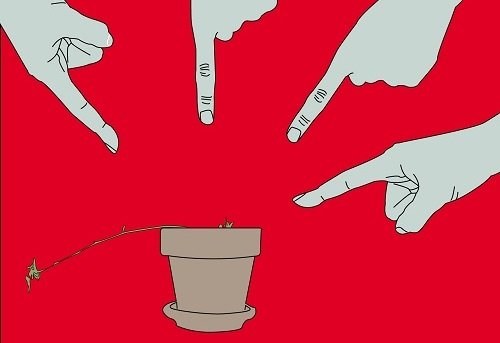Scapegoating, Justice, and Atonement
“Blame” by 周小逸 Ian. Creative Commons 2.0.
Introduction
This series relates to both the topic of atonement and the topic of desire because, like fallen Adam in the garden, we desire to deflect blame, and therefore we scapegoat others. On the political level, this builds group cohesion and creates a social outsider, who is blamed for the group’s woes, who the group must exile or kill or marginalize in order to maintain a hopeful lie. Our page on Immigration Policy has some links on that.
This series explores what political scapegoating has looked like in the U.S. The blog posts illustrate what happens when you believe that the highest form of justice is retributive. Penal Substitutionary Atonement theology holds that divine justice is retributive, which is why white evangelical Americans have a unusual ability to scapegoat others. Compare this behavior to what Scripture actually calls Christians towards. See our Christian Restorative Justice Study Guide and general resources on Restorative Justice in the criminal justice system.
Messages and Resources on Scapegoating
Greg Arthur and Mako Nagasawa, In Conversation With… Ideos Institute, Nov 14, 2024. Link goes to the 19:25 minute mark, where Greg and Mako talk about the 2024 election. Mako talks about how Trump and Trump voters are drawn to the principle of retribution. Mako critiques this principle on theological grounds, and points out that White evangelicals, especially, are spiritually formed to exaggerate the principle of retribution and scapegoat people like immigrants, etc.
Donald Trump's Scapegoating and the Myth of Retributive Justice. The Anástasis Center blog, Feb 12, 2016.
An introduction to Rene Girard's scapegoat theory.
Donald Trump's Scapegoating and the Scapegoating of the Black Community. The Anástasis Center blog, Feb 15, 2016.
Observations about how Trump blames immigrants and China, not corporate executives, for jobs lost to other countries, and African Americans and other minorities for crime and other challenges.
What Lynching, Torture, and Scapegoating Have in Common: Penal Substitution. The Anástasis Center blog, Feb 18, 2016.
On retributive impulses towards "the other."
Why Penal Substitution is a Gateway Drug to Right-Wing Extremism. The Anástasis Center blog, Feb 22, 2016.
On God as sorting, not uniting, creation.
Why Evangelicals Scapegoat Gays, Muslims, Etc. The Anástasis Center blog, Feb 29, 2016.
On the sacrificial system in the Pentateuch.
Why Trump and Cruz Are the Direct, Logical Result of American Evangelical Theology. The Anástasis Center blog, Mar 6, 2016.
On the history of linkages between White Evangelicals and violence. Compares retributive vs. restorative justice, and by extension penal vs. medical substitutionary atonement, in Paul’s letter to the Romans and the Sinai covenant.
A Neuroscientific Reason for Why Retributive Justice is from the Fall, and Penal Substitution is Immature. The Anástasis Center blog, Apr 28, 2016.
On the Fall and the exile from the Garden as part of God’s restorative justice. Yet the Fall into corruption is why we use retributive justice with others, even though restorative justice gets better results.
Atonement and the Scapegoat Theory
Rene Girard, Are the Gospels Mythical? First Things, Apr 1996.
Wayne Northey, Presentation on Spirituality of Penal Abolition. ICOPA IX, May 2000. a paper on Academia.edu, contains a concise summary of Christian history
Rene Girard, Interview with CBC, Part 1. Offensive Freedom, Jan 26, 2013. An excellent anthropology of scapegoating.
Rene Girard, Interview with CBC, Part 2. Offensive Freedom, Jan 26, 2013. Treats Leviticus 16 and the Jewish practice of the scapegoat and atonement; also says the Joseph story is the reversal of the Oedipus story, where Joseph is innocent (Oedipus as scapegoat is guilty) and brings reconciliation (not death and division). In addition, Joseph tests his brothers by making Benjamin a scapegoat, but Judah refuses it and offers himself. The Joseph and Judah story exposes the scapegoating myth. It is anti-myth.
Rene Girard, Interview with CBC, Part 3. Offensive Freedom, Jan 26, 2013. Explains why non-instinctual desires are imitative, or mimetic, and therefore competitive; explains the biblical story of the fall in Genesis and redemption in the Gospels; why imitating Jesus is non-violent and non-competitive
Richard Feloni, Peter Thiel Explains How an Esoteric Philosophy Book Shaped His Worldview. Business Insider, Nov 10, 2014. Thiel was influenced by Rene Girard
Dania Rodrigues, The Ancient Greeks Sacrificed Ugly People. Atlas Obscura, Oct 30, 2015. part of the cultural backdrop which Christians rejected.
Adam Ericksen, Rene Girard and the Mechanisms of Violence. Christian Transhumanist Podcast, Nov 30, 2015.
Sarah Kaplan, The Darker Link Between Ancient Human Sacrifice and Our Modern World. Washington Post, Apr 5, 2016.
Tyler Graham, Death to the Death Penalty? René Girard’s Challenge to Thomas Aquinas. The Imaginative Conservative, Nov 2018. An example of humility from conservatives.
Howard Mortman, Twitter, Mar 26, 2025. A British reporter asks Marjorie Taylor Greene a question about Defense Secretary Pete Hegseth using the commercial app Signal to discuss attack plans, which both included Jeffrey Goldberg, editor in chief of The Atlantic, by accident, and is illegal because it is a private app used to avoid FOIA requests. MTG responds by deflecting to “immigrants”. This is how scapegoating immigrants works.
Ashton, Why We Hate Welfare Freeloaders (But Shouldn't). Type Ashton, Apr 6, 2025. Ashton begins by citing a fascinating psychological experiment about people who choose a social system where they can punish freeloaders over a social system where they cannot. Most people choose the punishment system. She then cautions us against scapegoating immigrants or food stamp beneficiaries because of facts: immigrants contribute to the economy; food stamp beneficiaries are overwhelmingly children, elderly, disabled, and even employed at low-wage work. Why not require employers to pay a living wage and give better health benefits?
Radhika Desai and Michael Hudson, Trump’s Tariffs Are Part of a Class War on His Own Base. Geopolitical Economy Report, Apr 6, 2025. Desai and Hudson believe Trump’s tariff’s policy is part of another big lie that he sold to the American people. He couldn’t say that the US economy is fine, because too many people felt pain. But he also couldn’t say that it was the result of four decades of neoliberal policy that privileged finance. So he scapegoated other countries for developing their own economies and selling products back to the US. He also doesn’t understand dollar global dominance and foreign purchase of US debt and assets as the root cause of why corporations moved their manufacturing offshore. Trump’s tariff policy will therefore likely hurt his own base the most. He misdiagnosed the problem and has a more pro-corporate, laissez faire approach to managing capitalism. So Wall Street will continue to run the US government, not vice versa.
Rachel Maddow, Trump Exposed in Hot Mic Moment Planning Further Abuse of Power. The Rachel Maddow Show | MSNBC, Apr 15, 2025. Trump met with El Salvadoran President Nayib Bukele, self-dubbed “the world’s coolest dictator,” about his intention to deport American citizens to prison in El Salvador. Sherrilyn Ifill, civil rights lawyer and law professor, says that Trump will probably send people already incarcerated Americans to El Salvador. The Fifth Amendment requires due process for all persons, not just citizens. The Eighth Amendment prevents cruel and unusual punishment.
Emily Jashinsky and Ryan Grim, Breaking: El Salvador Caves, ICE Arrests US Citizen, Trump Attacks Fed. Breaking Points, Apr 18, 2025. At the 9 minute mark, U.S. Representative Tim Burchett (R-TN) on News Nation says that Trump/ICE is perfectly right to send “homegrown criminals” or U.S. citizens to El Salvador’s prison. “I don’t want Donald Trump teaching my daughter’s Sunday School class, but dag gum I like him in the White House because he understands the rule of law, I feel like. America is sick of this stuff.”
Lynching, Prisons, and the Theory of Divine Retributive Justice
Wayne Northey, Presentation on Spirituality of Penal Abolition. ICOPA IX, May 2000. A paper on Academia.edu, contains a concise summary of Christian history
Paula J. Giddings, Ida: A Sword Among Lions: Ida B. Wells and the Campaign Against Lynching. Amistad | Amazon page, Mar 3, 2009.
Dominique Gilliard, Sunday Lynchings: The Church's Role in Our Nation's Legacy of Racism. Converge Oakland, Feb 27, 2013.
Jamelle Bouie, Christian Soldiers: Lynching and Torture in the Jim Crow South Weren't Just Acts of Racism, but Religious Rituals. Slate, Feb 10, 2015.
Kaia Stern, Voices from American Prisons: Faith, Education, and Healing. Routledge | Amazon page, Jun 10, 2015. Ch.2 is about the impact of Augustine, Calvin, and penal substitution.
Tim Molloy, Der Sturmer: Why There Are So Many Pictures of the Nazi Tabloid Today. The Wrap, Mar 1, 2017. Trump’s plan to publicize crimes by illegal immigrants draws comparison to a tactic used by the Nazis. Stoking fear and then a desire for retribution is the authoritarian populist playbook.
Julie Zauzmer, Christians Are More Than Twice as Likely to Blame a Person's Poverty on Lack of Effort. Washington Post, Aug 3, 2017. Because white evangelicals believe in penal substitution and therefore believe that God's highest justice is meritocratic-retributive; something Mako commented on in a blog post, Why Penal Substitution is a Gateway Drug to Right Wing Extremism
Julie Perkins, The Most Dangerous Sermon Ever Preached. Relevant Magazine, Feb 6, 2018. An interview with Brian Zahnd critiquing Jonathan Edwards, Puritan Christianity, and retributive justice.
Stephen Waldron, Christianity, Cruelty, and Lies. Moralizing God | Substack, Feb 19, 2025.
“Cruelty and the pleasure that some people take in it is dangerously empty. In the Christian story, along with the prophets and martyrs, Jesus is the victim of cruelty that was based on lies. We might think that this is a clear foundation for Christian rejection of cruelty. But the emptiness of this cruelty means that it can also be used to inspire cruelty and lies.
Such cruelty and lies were quickly and consistently turned against another scapegoat. In the earliest centuries of Christianity, prominent Christian leaders consistently engaged in anti-Judaism. Building on the twisted myths of medieval antisemitism, Martin Luther called for Jewish synagogues and schools to be burned and for Jews to be subjected to manual labor. (The oddest justifications of Luther’s antisemitism point out that he was upset at the time he was writing. Thing is, antisemites are often unhappy while spouting their antisemitism.)
By the 20th century, Christians performing “passion plays” at Oberammergau in Germany and at Eureka Springs in the United States did so as an exercise in violent antisemitism. (Gerald L. K. Smith, the key founder of the popular passion play in Arkansas, was one of the foremost promoters of white supremacism and antisemitism in the United States during his lifetime.) Even the director of a widely-viewed 21st century passion play on film, The Passion of the Christ, is known to have been a virulent antisemite.”
Jonah Goldberg, A Unified Field Theory of Trump. The Dispatch, Mar 8, 2025. Goldberg turns to Trump’s pattern of scapegoating.
ABC 13 News, Economic Experts Weigh In on the Trade War Impact on the Stock Market. ABC 13 News, Mar 11, 2025. Dave Brat, an economist, former Congressman, and now a Senior VP at Liberty University, a flagship school for White evangelicals, especially Southerners, said on a video interview that Trump’s tariffs are following “reciprocity,” which he said is the Golden Rule: “whatever you do to us, we’re gonna do to you.” Surely this is evidence that Penal Substitution and the theory of divine retributive justice has broken the minds of White evangelicals. The Golden Rule is aspirational, not retributive. See the 59:32 minute mark of Tim Miller, Trump Admits He’s Violating the Constitution (w/ David French). The Bulwark, Mar 14, 2025.
Jonathan V. Last, The Faces of Trump’s Anti-Immigrant Crusade. The Bulwark, Mar 18, 2025. The government deported a 10-year-old American citizen with brain cancer.
“Do you know what a “lynching postcard” is?1 In post-Civil War America people would take photos of the lynchings of African Americans and print them up as postcards. That’s right. Pictures of smiling white people next to a dead black person they had just murdered. Americans would trade these postcards and collect them. They’d even use them as actual postcards and send them through through the mail.2 Hey Uncle Jedidiah! We’re having a great time in Alabama. Wish you were here. This practice persisted through the 1940s. Don’t look away from this, because it’s the truth: There are Americans—lots of them—who get off on dominating the people they hate. The Hemingway line is terrifyingly true: “There are many who do not know they are fascists but will find it out when the time comes.”
Peter Zeihan, The Russian Reach: Christian Ultranationalism. Zeihan on Geopolitics, Mar 20, 2025. Very important topic. There are connections between the Russian Orthodox nationalism and White American Evangelical-Catholic nationalism, including via the “National Prayer Breakfast.” The Russian popular consciousness includes its suffering at the hands of others, but not their own oligarchs.
Peter Wehner, Trump’s Appetite for Revenge Is Insatiable. The Atlantic, Mar 20, 2025. This pattern of behavior, kicked off with Trump’s campaign promise, “I am your retribution”, shows how much people are being drawn by anger and fear into Trump’s pathologies. For Evangelicals, one major channel is theological: Penal Substitutionary Atonement and the theory of divine retributive justice.
Jon Evans, Prof G on AI Eating Itself, Social Media Rage & the End of the CMO. Uncensored CMO, Apr 2, 2025. At the 9 minute mark, Scott Galloway points out that social media has shown us that rage sells even better than sex.
Decoding Fox News, X/Twitter, Jun 30, 2025. Re: Alligator Alcatraz. “Cruelty is the point - several Fox News hosts seemed gleeful at the notion that a detained migrant might be attacked and eaten by a crocodile or killed by a python. Good Christian folks laughing about animals eating prisoners. Jesse Watters seems to think they are all named Jose.”
Desire: Topics:
Here’s how to understand this section on Desire: We believe Jesus’ own human desires, journey, and teaching are normative for human becoming, so we pursue Christian Spiritual and Emotional Formation to help us better understand pastoral, relational, and communal questions that come up as we pursue Jesus’ vision for human flourishing. We stay aware of research and reflections on Human Moral and Emotional Development. Many insights into the mind-brain-body connection in Neuroscience and Epigenetics and Sleep and Rest are helpful. We follow research on Happiness, track resources about Greed and How Money Makes Us More Greedy, maintain the biblical critique of Interest Rate Lending and Debt as a way people fund overconsumption and entrap themselves, point out in Consumption how capitalist overconsumption and addiction challenge the notion that we are “sovereign individuals,” critique the Sex Industry for how the sex industry distorts human moral and emotional development. Human Destiny itself can be understood through the lens of desire.















